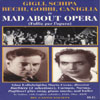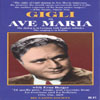Gigli - Ave Maria
A chance to experience Gigli acting and singing with passion and Gobbi in a wonderful performance of Pagliacci’s Prologue
View record and artist detailsRecord and Artist Details
Composer or Director: Gioachino Rossini, Franz Liszt, Georges Bizet, Ruggiero Leoncavallo, Rodolfo Falvo, Moisés Simons, Umberto Giordano, Carl Maria von Weber, Vincenzo Bellini
Label: Bel Canto Society
Magazine Review Date: 9/2000
Media Format: Video
Media Runtime: 95
Catalogue Number: BCS0493

Tracks:
| Composition | Artist Credit |
|---|---|
| Grandes études de Paganini, Movement: No 3 in G sharp minor, 'La Campanella' |
Franz Liszt, Composer
Franco Mannino, Piano Franz Liszt, Composer Ornella Santoliquido, Piano |
| Marta |
Moisés Simons, Composer
(Anonymous) Orchestra Beniamino Gigli, Tenor Moisés Simons, Composer |
| (Il) Barbiere di Siviglia, '(The) Barber of Seville', Movement: ~ |
Gioachino Rossini, Composer
Gioachino Rossini, Composer Tito Schipa, Tenor Tito Schipa, Guitar |
| Dicitencello vuie |
Rodolfo Falvo, Composer
Rodolfo Falvo, Composer Tito Gobbi, Baritone |
| Andrea Chénier, Movement: ~ |
Umberto Giordano, Composer
(Anonymous) Orchestra Chorus Maria Caniglia, Soprano Umberto Giordano, Composer |
| Carmen, Movement: ~ |
Georges Bizet, Composer
(Anonymous) Orchestra Beniamino Gigli, Tenor Chorus Georges Bizet, Composer Maria Caniglia, Soprano |
| Pagliacci, 'Players', Movement: Si può? (Prologue) |
Ruggiero Leoncavallo, Composer
(Anonymous) Orchestra Beniamino Gigli, Tenor Ruggiero Leoncavallo, Composer |
| Norma, Movement: ~ |
Vincenzo Bellini, Composer
(Anonymous) Orchestra Chorus Maria Caniglia, Soprano Vincenzo Bellini, Composer |
| Invitation to the Dance, 'Aufforderung zum Tanze' |
Carl Maria von Weber, Composer
(Anonymous) Orchestra Carl Maria von Weber, Composer |
Composer or Director: Giuseppe Verdi, Ernesto De Curtis, Giacomo Puccini
Genre:
Vocal
Label: Bel Canto Society
Magazine Review Date: 9/2000
Media Format: Video
Media Runtime: 88
Mastering:
ADD
Catalogue Number: BCS0492

Tracks:
| Composition | Artist Credit |
|---|---|
| Maria |
Ernesto De Curtis, Composer
Beniamino Gigli, Tenor Berlin Opera Chorus Berlin Opera Orchestra Ernesto De Curtis, Composer |
| (La) Bohème, 'Bohemian Life', Movement: Che gelida manina |
Giacomo Puccini, Composer
Beniamino Gigli, Tenor Berlin Opera Orchestra Giacomo Puccini, Composer |
| (Il) trovatore, Movement: ~ |
Giuseppe Verdi, Composer
Beniamino Gigli, Tenor Berlin Opera Chorus Berlin Opera Orchestra Giuseppe Verdi, Composer |
| (La) traviata, Movement: ~ |
Giuseppe Verdi, Composer
Beniamino Gigli, Tenor Berlin Opera Chorus Berlin Opera Orchestra Erna Berger, Soprano Giuseppe Verdi, Composer |
Author: John Steane
The first has Gigli cast as a celebrated tenor called Tino Dossi (a near-miss for Tino Rossi but perhaps that gifted entertainer and light tenor had not come to the fore by then). Dossi is mourning the death of his beloved Maria and is conned by a nightclub singer who tells him her name is Maria, too. She grows fond of him, and the deception becomes odious to her; she writes a letter and prepares to leave. Meanwhile, Dossi has left for Paris to sing in La traviata. The woman follows and takes her seat in a front box. In the interval, before the scene of Flora’s party, Dossi learns of the betrayal, so that when it comes to the ‘Scena della borsa’ he directs Alfredo’s reproaches and denunciations towards the box. Gigli’s mouth, normally half-closed while singing, becomes wider and wider, and his acting comes to life with genuine passion. This is worth having.
The second film (
Discover the world's largest classical music catalogue with Presto Music.

Gramophone Digital Club
- Digital Edition
- Digital Archive
- Reviews Database
- Full website access
From £8.75 / month
Subscribe
Gramophone Full Club
- Print Edition
- Digital Edition
- Digital Archive
- Reviews Database
- Full website access
From £11.00 / month
Subscribe
If you are a library, university or other organisation that would be interested in an institutional subscription to Gramophone please click here for further information.




